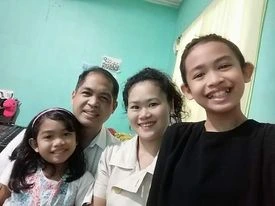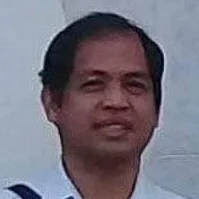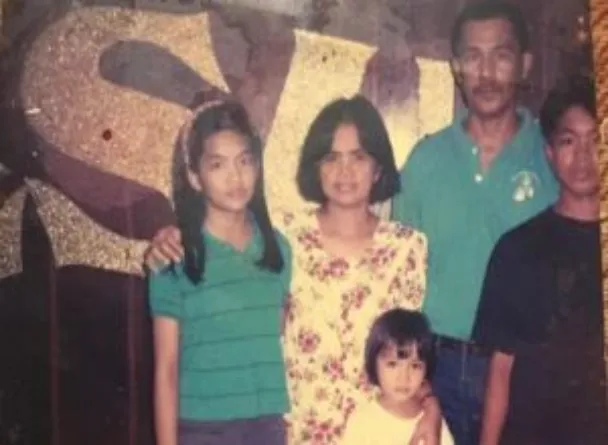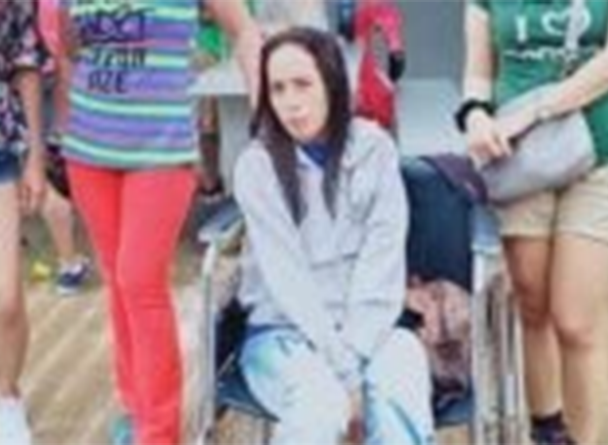People got scared of them even their own family members because there were not enough scientific and medical explanations about the condition yet.
I am one of the blessed women who got to wed the love of my life and create a wonderful family that I deeply love.
I am a father, and an ordinary man. I am a good provider, patriarch of our family, husband to a beautiful and loving wife, and father to two amazing daughters: Nasha (13 years old) and Chaste (9 years old).
We had a simple life, yet happy and content. Though life was simple, it seemed like I had everything, and there was nothing more I could’ve asked for. But something changed it.
I was struck with a rare neurodegenerative disorder. It is a recessive movement disorder occurring to mostly adult males whose roots can be traced in Panay Islands in the Philippines. It manifests either or both dystonic (involuntary muscle movement and abnormal posture) and parkinsonian (slow movement, tremors) traits.
Prior to the diagnosis of my illness, I have already learned about my family’s history with it. Since then, I was on lookout for the symptoms which I might manifest. It was frightening knowing that there was a great possibility that I, too, would have it. I had to prepare myself to the realities that might take place.
 All the thoughts of its possibilities unfolded about 10 years ago. I noticed myself showing symptoms. It started with hand tremors and stiff neck pains; stuttering; difficulty in breathing and speaking due to spasm in my stomach, and numbing shoulder pain that radiates in my back and neck. Everything worsened as the symptoms progressed.
All the thoughts of its possibilities unfolded about 10 years ago. I noticed myself showing symptoms. It started with hand tremors and stiff neck pains; stuttering; difficulty in breathing and speaking due to spasm in my stomach, and numbing shoulder pain that radiates in my back and neck. Everything worsened as the symptoms progressed.
This disorder is an incurable disease but there’s a procedure that can be done to manage its symptoms. It is called Deep Brain Stimulation (DBS). According to studies, patients who were given DBS procedures have improved significantly over time without adverse side effect. Some were even able to work again, though the disease was not fully eliminated. But still, it was the closest and the best medication I could have to bring back my normal life. It was a glimmer of light.
I held on to this strand of hope to finally alleviate the daily excruciating pain. But hope was all I had because we didn’t have the money to pay for the procedure. We needed at least a million pesos to get it started but the money we needed was way more than what we could raise. Even then, hope, accompanied with fervent prayer, was enough because we were able to raise the money thanks to the love and financial support of my family, relatives and friends. I underwent my DBS operation in February 2019. And after almost a year, my excruciating pain was partially gone. I was blessed that I was operated and given a second life to be with my family.
Since I wanted to be productive again and be able to provide for my family, my wife referred me to apply for a scholarship and be part of a great community that understands me. She introduced me to Virtualahan. “Learning is fun” at Virtualahan. They really take good care of PWDs. They understand our learning struggles and circumstances because we have coaches who have disabilities too but were able to get past their disabilities and became great potentials. Seeing them gave me so much hope.
Though right now I still have my illness and could still feel pain every now and then, I still feel blessed because I feel the love of the Lord for me and my family in these trying times.
I am also thankful that this situation happened to me at a time when my condition has been discovered and well-researched. I’m sure it was way harder for those who were sick years ago because they were labeled as “aswang” or “cursed”. People got scared of them even their own family members because there were not enough scientific and medical explanations about the condition yet.
That being said, I want to take this opportunity to raise awareness about neurodegenerative conditions. If you know that your family has a history, regardless the symptoms, regardless the gender, you should start discussing it with your family and start doing research about it. It is much better to be informed and face the problem rather than box yourself, keep silent about it and not understand it.
It also important to know that this is not a virus, people don’t get the disorder by just merely being near the patient. And those who are in the same situation, it’s not their fault that they are trapped in this dilemma. They are humans too; they have imperfections just like everyone else. They need love and care more than ever and not our prejudice.
The disorder only affects the muscles and muscle movement not their mental and emotional ability. So even if they couldn’t talk anymore, they can understand very well. They get hurt with hurtful words. They still worry about their family. And inasmuch as they don’t want to be a burden to others, they still feel helpless. This is why in a lot of cases their worries add up to the physical and emotional sufferings they already feel.
If we really love and care for them, why not give unconditional love and care. Show that they are not alone and that they need not to worry about the situation. That’s the best that we can do for them.
That’s the best thing you can do for us.
PETER JOHN DELA CRUZ
Batch 31


